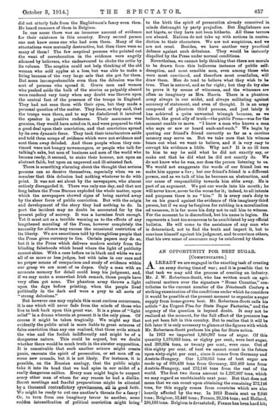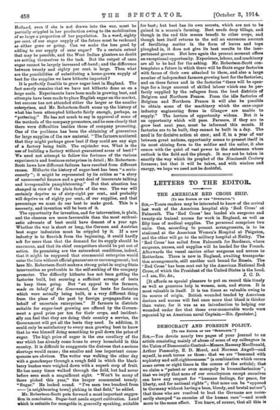A LREADY we are engaged in the exacting task of creating
an army during time of war ; and it is possible that to that task we may add the process of creating an industry. Mr. J. W. Robertson-Scott, who has written much on agri- cultural matters over the signature " Home Counties," con- tributes to the current number of the Nineteenth Century a
striking examination of the conditions under which he considers it would be possible at the present moment to organize a sugar supply from home-grown beet. Mr. Robertson-Scott calls his article " An Urgent Plea for State Sugar Factories," and the urgency of the question is beyond doubt. It may not be realized at the moment, for the full effect of the pressure bas not yet been felt in this country, But to realize that it will be felt later it is only necessary to glance at the figures with which Mr. Robertson-Scott prefaces his plea for State action.
In 1913 we imported 1,969,887 tons of sugar. Of this quantity 1,570,053 tons, or eighty per cent., were beet sugar, and 399,834 tons, or twenty per cent., were cane. Out of this eighty per cent. of beet we cannot count in the future upon sixty-eight per cent., since it comes from Germany and Austria-Hungary. Our 1,570,053 tons of beet sugar are made up of 938,438 tons from Germany, 359,4.69 tons from Austria-Hungary, and 272,146 tons from the rest of the world. The first two items amount to 1,297,907 tons, which we may regard as unobtainable next year. But that does not mean that we can count upon obtaining the remaining 272,146
tons, for this supply comes from countries which are also heavily affected by the war. In 1913 Russia sent us 2,940 tons ; Belgium, 52,446 tons ; France, 26,594 tons ; and Holland, 190,166 tons. Belgium is devastated; France has been hard hit; Holland, even if she is not drawn into the war, must be partially crippled in her production owing to the mobilization of so large a proportion of her population. In a word, eighty per cent. of our sugar supply of the future must be reckoned as either gone or going. Can we make the loss good by adding to our supply of cane sugar P To a certain extent that may be possible, and the West Indian planters no doubt are setting themselves to the task. But the output of cane sugar cannot be largely increased off-hand ; and the difference between twenty and eighty per cent. is large. Then what are the possibilities of substituting a home-grown supply of beet for the supplies we have hitherto imported P It is perfectly feasible to grow sugar-beet in England. The fact merely remains that we have not hitherto done so on a large scale. Experiments have been made 221 growing beet, and attempts have been made to place English sugar on the market, but success has not attended either the larger or the smaller enterprises, and Mr. Robertson-Scott sums up the history of what his been attempted hitherto fairly enough, perhaps, as "pottering." He has not much to say in approval of some of the methods of the company promoters, and he sees clearly that there were difficulties besides those of company promoting. One of the problems has been the obtaining of guarantees for large supplies of the raw material. " The farmers muttered that they might perhaps grow beet if they could see any sign of a factory being built. The rejoinder was, What is the use of building a factory without guaranteed areas of beet?" We need not attempt to follow the fortunes of the various experiments and business enterprises in detail ; Mr. Robertson- Scott hows how different failures have resulted from different causes. Hitherto the history of sugar-beet has been " a serio- comedy "; it might be represented by its critics as "a story of unsuccessful finance and a great deal of inaccurate talking and irresponsible pamphleteering." But that situation has changed in view of the plain facts of the war. The war will certainly deprive us of sixty-eight per cent., and probably will deprive us of eighty per cent., of our supplies, and that percentage we must do our best to make good. This is a necessity, and invention will be born of it.
The opportunity for invention, and for intervention, is plain, and the chances are more favourable than the most enthusi- astic advocate of beet could have dreamt of a year ago. Whether the war is short or long, the German and Austrian beet sugar industries must be crippled by it. If a new industry is to flourish from the beginning, it could hardly ask for more than that the demand for its supply should be enormous, and that its chief competitors should be put out of action. So promising are the antecedent conditions, indeed, that it might be supposed that commercial enterprise would enter the lists without official guarantees or encouragement; but here Mr. Robertson-Scott makes a strong point in urging State intervention as preferable to the self-seeking of the company promoter. The difficulty hitherto has not been getting the factories built, but securing a sufficient acreage of beets to keep them going. But "an appeal to the farmers, made on behalf of the Government, for beets for factories which were actually being built, is a very different thing from the pleas of the past by foreign propagandists on behalf of uncertain enterprises." If farmers in districts suitable for sugar-beet growing are offered by the Govern- ment a good price per ton for their crops, and incident- ally can feel that they are doing their conntry a service, the Government will get all the beets they need. In addition, it could only be satisfactory to every man growing beet to know that he was himself doing something to pull down the price of sugar. The high price of sugar is the one corollary of the war which has already come home to every household in this country. It is difficult to exaggerate the distress that a serious shortage would cause ; the smaller and less important conse- quences are obvious. The writer was walking the other day with a gamekeeper through a rough field in which the black- berry bushes were weighed down with a superb crop of fruit. He has many times walked through the field, but had never before seen such a magnificent sight " Won't be many of those picked this year," the keeper commented tersely. " Sugar." He looked round. " rye seen two hundred from — [a neighbouring town] picking in that field," he added.
Mr. Robertson-Scott puts forward a most important sugges- tion in conclusion. Sugar-beet needs expert cultivation. Land which is suitable for mangolds is, generally speaking, suitable for beet ; but beet has its own secrets, which are not to be gained in a season's farming. Beet needs deep tillage, and though in the end this means benefit to other crops, and though beet itself returns to the soil an enormous amount of fertilizing matter in the form of leaves and tops ploughed in, it does not give its best results to the inex- perienced grower. But here again the present moment offers an exceptional opportunity. Experience, labour, and machinery are all to be had for the asking. Mr. Robertson-Scott con- templates a future in which there will be State sugar factories with farms of their own attached to them, and also a large number of independent farmers growing beet for the factories; and on these farms and in the factories "there will be open- ings for a large amount of skilled labour which can be per- fectly supplied by the refugees from the beet districts of Belgium and Northern France. From the idle factories of Belgium and Northern France it will also be possible to obtain some of the machinery which the cane-sugar industry engineering firms in Glasgow are unable to supply." The horizon of opportunity widens. But it is an opportunity which will pass. Farmers, if they are to grow beet next year, must be informed this month. If factories are to be built, they cannot be built in a day. The need is for decisive action at once; and if, in a year of war between great nations, opportunity seems to present itself in its most shining form to the soldier and the sailor, it also comes with the quiet of vast power to the statesman whose outlook is the field and the plough. It may not be taken in exactly the way which its prophet of the Nineteenth Century foresees; but that it will be taken, and with wisdom and energy, we hope we need not be doubtful.











































 Previous page
Previous page